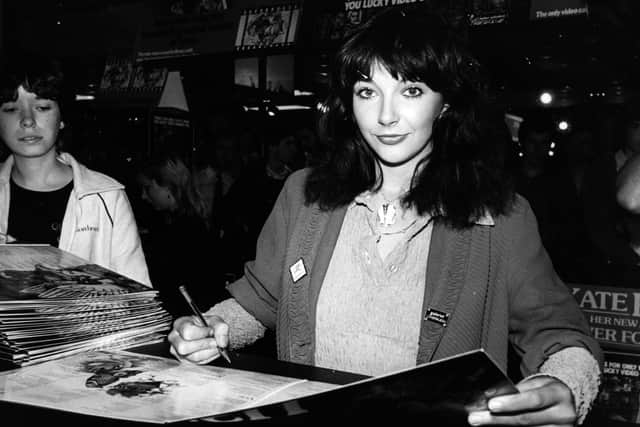Rail strikes, Arthur Scargill, Kate Bush: I woke up and was back in the 1980s - Bill Carmichael
The evidence was all around me, and the weirdness began as soon as I opened my morning newspaper to see a picture of former NUM leader Arthur Scargill on a picket line in Wakefield. What!?
A “Summer of Discontent” as one newspaper described it.


Further stories revealed that inflation is rapidly approaching double figures; taxes are witheringly high and economic growth sluggish.
Advertisement
Hide AdAdvertisement
Hide AdI then thought “someone please wake me up” when I realised that Russia and the West are at each other’s throats, with a very real threat of nuclear war.
To someone who lived through those far off days, it was all strikingly familiar. As another 1980s icon, Del Boy Trotter, might have said: “It’s like déjà vu all over again.”
But the absolute clincher was to discover Kate Bush was number one in the pop charts. Have I really been Running up that Hill for the last – gulp! – 37 years?
Perhaps during the night I had somehow sleepwalked myself into the passenger seat of Marty McFly’s DeLorean time machine and landed back in the UK four long decades ago?
Advertisement
Hide AdAdvertisement
Hide AdTo refresh your memory, the industrial strife that brought the UK to its knees actually began in the acrimonious “Winter of Discontent” in 1978, during the dying days of Jim Callaghan’s Labour government, when industrial action saw bodies left unburied and rubbish piling up on the streets.
The chaos that followed was a major factor in the demise of the Labour government, and the election of the Conservatives led by Margaret, later Baroness, Thatcher.
Then as now, Labour was bitterly divided over whether to back or oppose the striking trade unions, which of course bankroll the party. The then leadership resisted the strikes, but many left wing MPs and much of the membership backed them.
The parallels with today are obvious. Labour leader Sir Keir Starmer ordered his team not to join the picket lines this week, but many MPs – including frontbenchers – not only ignored him, but also openly defied him, making the Leader of the Opposition look weak.
Advertisement
Hide AdAdvertisement
Hide AdI make no comment, but merely note that the last time such division was visible in Labour ranks in 1979, the party did not go on to form a government or taste power for 18 long years of Conservative rule.
Make of that what you will, but voters don’t like a divided party.
And to the RMT members standing on the picket line in Wakefield I say remember one important thing that a embittered former miner told me – Arthur Scargill began the strikes in the 1980s with a big union and a small house, and ended the dispute with a small union and a big house (plus a £2m London flat).
Sadly, his union members did not fare quite so well.
There are key differences between now and then, however.
Back in 1980, shortly after Margaret Thatcher began her first term of office, inflation was far worse than today at almost 18 per cent and this made everyone poorer, but it particularly hit the less well off.
Advertisement
Hide AdAdvertisement
Hide AdSqueezing out inflation was an incredibly painful and difficult process and I can well remember at the time anxiously looking at yet another interest rate rise and wondering if I could afford to continue with my mortgage and car loan. High interest rates made starting a business or buying a house far more difficult than it should have been.
I understand union members wanting to catch up with increasing prices with big pay rises, but do we really want to get into that horrible wage-price spiral again that benefits no one?
There will be no Back to the Future for me. I’ll be climbing back aboard the time machine and setting the dial for 2022, and hoping we don’t repeat the mistakes of yesteryear.
And perhaps the past can teach us important lessons.
Mrs Thatcher and her reforming Chancellor of the Exchequer, Nigel Lawson, eventually tamed the beast of inflation, cut unemployment, boosted growth and set the UK on the path of prosperity that has lasted, with the odd dip, for more than 40 years.
And how did they achieve this economic miracle?
The answer can be summed up in two words – tax cuts.
